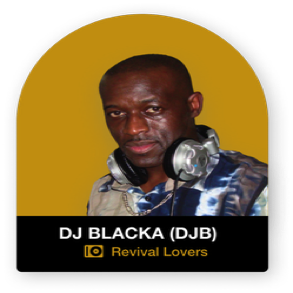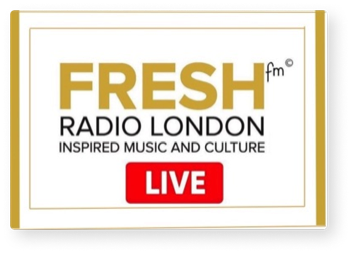PRESENTER BIO

DJ Blacka started playing music at the age of seven on the family gram. He was born to entertain, being a 60s child (first born) with Jamaican parents whose main home comfort was music.
At the age of 14, Blacka started his first sound system, Elijah. He started playing music at school and this was where he was given the name “Blacka” due to his smooth chocolate complexion.
Blacka cannot remember the first vinyl record that he bought, but the second, using his pocket money was “Eighteen with a Bullet” by Derek Harriott, from Palmer Records in Harlesden, London. When asked if he was buying for his mother “No, this is for me, I have my own sound system now”. Mr Palmer just smiled. This little shop went on to become Jet Star Records, the largest reggae distribution centre in the world.
In the 70s, Blacka and his sound Elijah played in many places such as The Danes and the local youth centre. By age 17, he had a large collection of records and, in 1976, he got a job at Fidelity Radio starting his electronic career.
This gave him the funds to increase his record collection and in 1976 he met two people who were the real starting point of the great music he has accumulated: firstly Jean, a supervisor at Fidelity Radio who every Friday showed Blacka a list of new records, many on pre-release. Secondly, Ernie Harriott (cousin of Derek Harriott) who used to work at a greengrocers in Harlesden, and selling records along with the fruit and veg. Ernie went on to work for Hawkeye Records.
When Elijah broke up, Blacka and his brother went on to join Java Sound System in 1980. He still had a lot of play outs for weddings, parties, college dances and clubs such as Alperton Youth Centre, Kingfishers, London Apollo, Four Aces, All Nations, Night Moves and Metro.
Blacka also worked from home making pre amplifiers and amplifiers for local sound systems and repairing televisions. During 1982 he met Hartley Rochester, who was based at the old Stonebridge Bus Garage, who had a contract for fixing video juke boxes. In 1982, Blacka started working part time in the Bus Garage. There they met an exciting young man, Michael Swaby, who had huge ideas and eventually they started working together video recording pool tournaments and this helped Blacka develop new camera skills and be able to record reggae artists’ music videos and concerts. This was right up Blacka's street, his love of music coupled with seeing the artists performing. Artists included Smiley Culture, Undivided Roots, Aswad, I Jahman, the first Tony Williams Reggae Niteout, plus many, many more.
Having to moving from the bus garage, the opportunity opened to move into offices in High Street, Harlesden from where, with three other friends, they decided to set up an FM radio pirate station, and so Time Radio was born and his radio career began. DJ Blacka's first show was 10pm till 12 and as the station was not yet 24 hours, he was asked to lock up and drop the keys off. Eventually, he was given the Friday 10pm till 12 slot and Saturday and Sunday, 8pm till 10pm. His shows quickly became popular with plenty of phone calls from start to finish. Some of the best times on Time Radio were shows at The Mean Fidler, Acton Town Hall and Great Yarmouth, all of which were a total ROADBLOCK.
After Time Radio split up, the love for music and the radio pushed them to start another community radio station, known as Fresh FM. DJ Blacka became one of London's top reggae revival DJs. At that time there were not many DJs playing his style of music. He had many great years at Fresh FM which stopped as they were offered a community radio licence to broadcast as a legal station. This was not granted. It was a shame as Fresh FM was a fantastic station with some of London's best DJs and presenters.
25 years later, Fresh FM Radio London is digital and improved. The station now targets mature listeners.
@Deej Blacka
